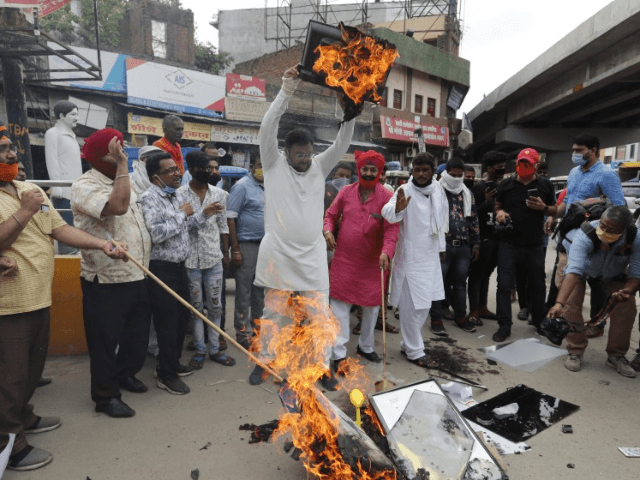China says Indians’ demands to boycott Chinese entities following a deadly clash between the two countries’ border troops on Monday are “extremely dangerous for India,” an editorial in the Chinese state-run Global Times argued on Wednesday.
On Monday, the ongoing Himalayan border dispute between China and India took a lethal turn when fierce fighting erupted between the two sides in the Galwan Valley of India’s northeastern Ladakh state. About 20 Indian soldiers were killed in the hand-to-hand combat between the unarmed forces, along with an estimated 40 casualties on the Chinese side.
Indian media reports that the Chinese troops used improvised weapons – reportedly iron rods, batons wrapped in barbed wire, and rocks – to savagely attack the Indian forces. According to the Indian military, Chinese soldiers killed one Indian commanding officer by pushing him off of a narrow ridge.
After news of the slaughter broke on Tuesday, the Indian media documented many instances of Indian citizens expressing their outrage at the massacre, with some protesters gathering to demand India boycott Chinese businesses and products. At some of the demonstrations, Indians burned images of Chinese dictator Xi Jinping while demanding retribution for the brutal killing of Indian servicemen at the hands of Chinese troops.
Police in south Delhi, India’s capital, arrested at least 22 demonstrators on Wednesday after they gathered outside the Chinese Embassy to protest Monday’s attack, the deadliest conflict between India and China since 1967. According to police, the demonstrators belonged to a group called Swadeshi Jagran Manch (SJM).
“The protesters started marching towards the Chinese Embassy after paying homage to the 20 martyred Indian soldiers. However, they were stopped mid-way by the police, as the area was cordoned off with barricades. Photographs and effigies of Chinese President Xi Jinping were burnt as a mark of protest. There was a minor scuffle between the protesters and the police after which 22 of our members were detailed,” Vikas Chaudhary, co-convenor of SJM, told the Hindustan Times.
SJM – an economic affiliate of the Hindu nationalist parliamentary organization Rashtriya Swayamsevak Sangh (RSS) – was called out by the Chinese Communist Party’s propaganda newspaper Global Times in its editorial piece on Wednesday:
The Swadeshi Jagran Manch (SJM), an affiliate of the Rashtriya Swayamsevak Sangh (RSS), on Tuesday renewed their demand for ‘an economic boycott of China and Chinese products’ … The anti-China group is calling for India to launch frictions with China ‘in trade and investment.’ … Some in India are enthusiastically promoting hostility toward China for their own interests … They have called for a China boycott each time an issue has arisen between the two neighbors, placing bilateral ties in a dangerous position.
The article’s author, identified as an “associate research fellow at the National Institute of International Strategy under the Chinese Academy of Social Sciences,” added: “It would be extremely dangerous for India to allow anti-China groups to stir public opinion, thus escalating tensions.”
The latest border dispute between India and China reflects a greater economic conflict between the two Asian nations, which has escalated in recent months. In May, Indian Prime Minister Narendra Modi announced plans for his government to enact economic subsidies, including “$60 billion of loan guarantees for small businesses, lenders, and power companies” in an effort to stabilize the Indian economy. Modi said he hoped this would subsequently attract multinational corporations away from China and into India for manufacturing purposes.
Last month, reports indicated that Apple plans to transfer “nearly a fifth” of its manufacturing from China to India, suggesting that Modi’s new initiative may have already begun to shift the economic balance between the two countries.

COMMENTS
Please let us know if you're having issues with commenting.